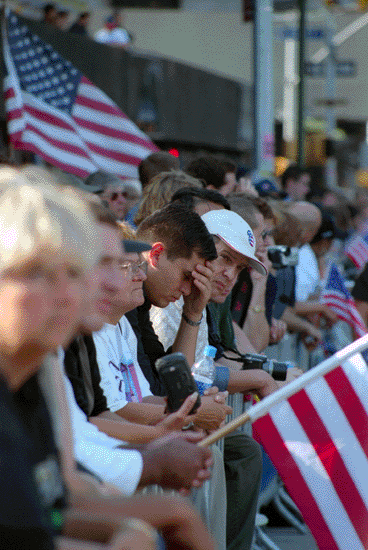
What is the
psychological impact of 9/11? |
|
Five years after the catastrophe on 9/11, its impact is still being felt. It continues to dominate the news and American consciousness. The recent release of the docudrama World Trade Center, the escalating war on terror, and the rising casualties in Iraq and Afghanistan all conspire to remind people that we are living in a post-9/11 era. The world has changed in fundamental ways - politically, culturally and psychologically. I have been asked by many media people about the psychological impact of 9/11. My short answer is: There are two kinds of people: Those who face the music and stand up to it, and those who run for cover. This is a memorable line from Col. Frank Slade, played by Al Pacino, in the movie Scent of a Woman, but the real world is more complicated than the black-and-white world inhabited by Col. Slade. The brave new world of positive survivors My longer answer is something like this: The psychological impact of 9/11 is both positive and negative. Those who react positively to 9/11 show signs of post-traumatic growth. Some of the characteristics of these positive people are:
There are many similar cases for survivors of tragic disasters. The most famous survivor who lived to tell his story and share his wisdom is Dr. Viktor Frankl, whose autobiography Man's Search for Meaning remains an all-time best seller. His wisdom for survival is contained in logotherapy, which literally means therapy through meaning. I have expanded logotherapy into meaning-centered counselling and therapy. The key steps are ABCDE: accept what cannot be changed, believe that there is hope and meaning in life, commit to forming the new habits of positive attitudes and actions, and discover one's purpose and meaning in life. Those who learn to apply these four steps will experience personal growth and transformation. The worried world of terror Those who react negatively probably include a much larger segment of the population. The most serious negative impact encompasses various psychological disorders, such as PTSD, depression, and anxiety. The full impact of 9/11 on mental health has been documented by many large studies.
Recurrent media-hype about potential terrorist threats and foiled terrorists plots further increase our sense of vulnerability. Like a darkening cloud on the horizon, it is just a matter of time before the storm will hit where we live. Some may loudly proclaim that they are not affected by threats of terrorism, and that for them life goes on as usual. This sounds like denial. Defense mechanisms may protect us against anxiety and fear, but they are capable of consuming their psychology energy and elevating the general level of our psychological discomfort. Others may take cover under various kinds of escapism, such as addictions, prescribed drugs, sexual obsession and the pursuit of thrills. Such coping strategies may numb our anxiety and pain temporarily, but eventually lead to self-destruction. The causes and effects of 9/11 continue to be debated both privately and in public discourse for a long, long time. The fact remains that we can never return to the pre-9/11 days. As individuals, we can choose to live in the brave new world of courage and hope, or in the grip of fear as victims of terror. |

 A
good example of positive impact is Cantor Fitzgerald's
A
good example of positive impact is Cantor Fitzgerald's  There
are also widespread more insidious effects on everyday life. In
addition to the common daily hassles, such as traffic jam, household
chores, we now have to experience additional hassles caused by increased
security measures whenever we travel. Some people may also have
experienced "harassment" when they apply for driver's license or
citizenship, if they originate from the "wrong" countries or belong
to the "wrong" race.
There
are also widespread more insidious effects on everyday life. In
addition to the common daily hassles, such as traffic jam, household
chores, we now have to experience additional hassles caused by increased
security measures whenever we travel. Some people may also have
experienced "harassment" when they apply for driver's license or
citizenship, if they originate from the "wrong" countries or belong
to the "wrong" race.